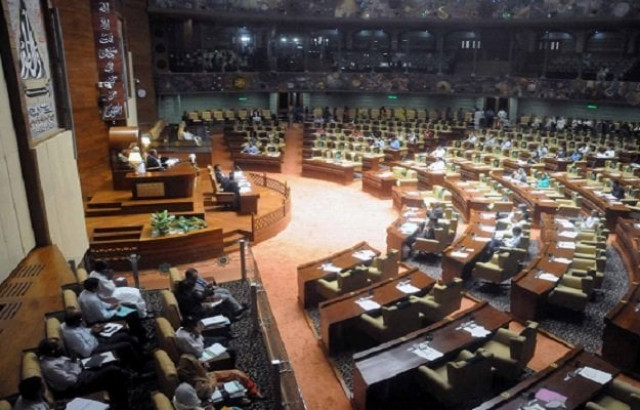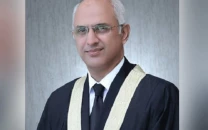New Sindh law renders LBs toothless
Opposition vows to challenge Sindh LG Amendment Bill 2021 passed by provincial assembly in SC

The Sindh Assembly on Friday passed a bill to amend the local government laws in the province, introducing drastic changes in its structure and taking back several powers from the elected representatives at the grassroots level.
Opposition parties vehemently rejected the Sindh Local Government Amendment Bill 2021, terming it a violation of Article 140-A of the Constitution and contradictory to the spirit of devolution of power to the grassroots level.
Under the new bill, most of the powers of the local bodies have been transferred to the provincial government. The bill abolishes the district councils and replaces them with town municipal corporations, while no rural area will be part of a metropolitan corporation.
The new bill introduces towns by eliminating districts in the metropolitan system. It stipulates that the maximum population of a metropolitan corporation will be five million, while a municipal town will comprise 125,000 people. The tenure of the local bodies has been fixed at four years.
Accordingly, the vice-chairmen of the union committees will be members of the town municipal council. The members of the town municipal council will choose the mayor and deputy mayor from among themselves through a secret ballot, instead of a show of hands.
Under the new law, local bodies will not be able to do any work in the fields of health and education, as the department of primary health, the first-aid department, hospitals, dispensaries and medical education have been withdrawn from them.
For Karachi, the new law abolishes the district council and replaces it with the town municipality. The new set up in the metropolitan city will have no authority over the Karachi Medical and Dental College, Abbasi Shaheed Hospital, Sobhraj Hospital, Leprosy Centre and Sarfraz Rafiqi Centre.
These institutions have been handed over to the Sindh government from the Karachi Metropolitan Corporation (KMC). Under the new law, birth and death registration certificates have also been withdrawn from the local bodies.
Also withdrawn are the powers of enacting laws regarding food and drink and registration of such institutions, which will be restored to the provincial government. Medical staff working in local bodies will now be subordinate to the Sindh government.
The bill returns the department of infectious diseases to the local bodies. It says that public toilets will be managed by local bodies, adding that the local government will collect advertisement fees from wedding halls and clubs.
Talking to the media, opposition leader Haleem Adil Sheikh said that the opposition parties would challenge the new bill in the Supreme Court, terming it a draconian law that was approved in the assembly in violation of the rules and procedure.
“The law is also contradictory to spirit of devolution of power to the grassroots level, particularly Article 140-A of the Constitution,” Sheikh, who belongs to the ruling Pakistan Tehreek-e-Insaf (PTI), said. “It will deprive local governments of their core functions and authorities,” he added.
Sheikh said that draft of the bill was kept a secret from assembly members till the last moment. “Even the assembly secretary was not given copies of the bill,” he added. “The bill was bulldozed. The rules require that bill has to be presented in the committee on local government.”
Muttahida Qaumi Movement-Pakistan (MQM-P) parliamentary leader Kunwar Naveed Jamil said that the Pakistan Peoples Party (PPP) government in Sindh had deprived the local government system of its powers that tantamount to injustice to the people of the province.
Read more Sindh Assembly rejects TTP talks
“The bill was laid in the house without taking opposition into confidence. Also, no open discussion was allowed,” he said, warning that the MQM-P might come out on the streets in protest against the undemocratic attitude of the PPP.
Grand Democratic Alliance (GDA) parliamentary leader Hasnain Mirza alleged that a civil dictatorship in Sindh was thwarting the democratic process in the province. “We are elected representatives of the people of Sindh and it is our responsibility to protect the rights and interests of the masses,” he said.
Mirza said that introducing secret balloting in the mayor election tantamount to promoting horse-trading and corrupt practices. He appealed to the Supreme Court and the Sindh High Court (SHC) to take notice of the situation, “as all the rules and norms of democracy are being violated”.
Abdur Rasheed of the Muttahida Majlis-e-Amal (MMA) said that the PPP demonstrated an undemocratic attitude in the assembly, as the opposition was not given the opportunity to discuss the bill. He termed the move a beginning of rigging and horse-trading in the local elections.
He demanded that the Karachi Development Authority (KDA), Sindh Building Control Authority (KBCA), Water and Sewerage Board (WSB), Solid Waste Management (SWM) and other civic services should be transferred to the local government institutions.



















COMMENTS
Comments are moderated and generally will be posted if they are on-topic and not abusive.
For more information, please see our Comments FAQ